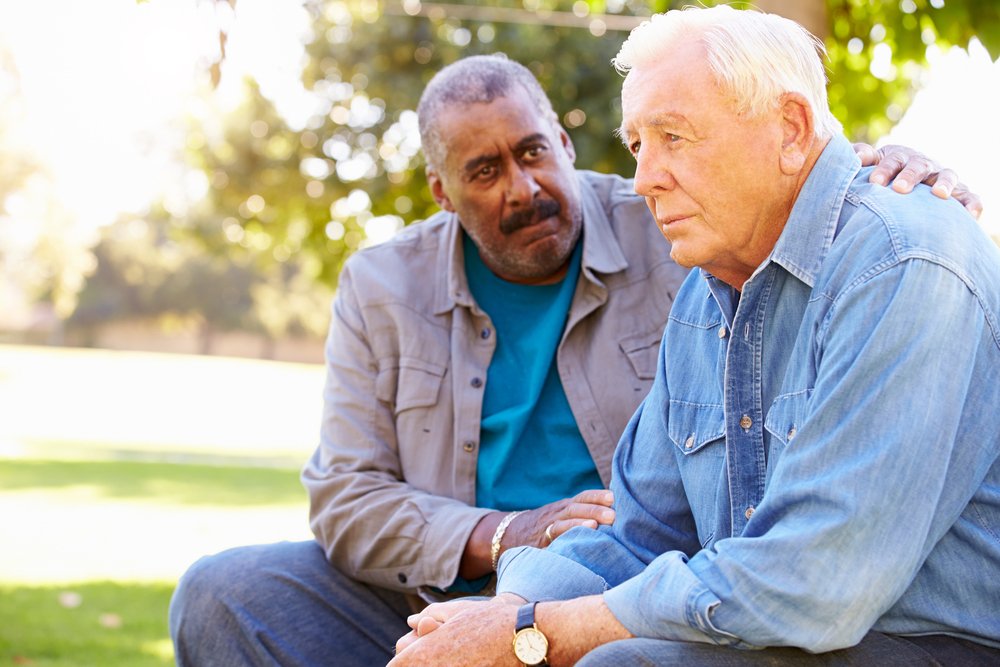When a friend is grieving, it's not always easy to know what to say or do to try and help them. Paula Stephens shares seven suggestions on how you can support a friend who is experiencing grief by showing compassion and kindness.
Few things make us feel more helpless than watching someone we love and care about suffer. When my son Brandon died, I remember my best friend coming into my bedroom, where I was curled up on the bed, and just sitting there for a long time. When I peeked out from the bedsheets, I saw in her face how helpless she felt. Her hands were shaking, and I could see she wanted to say or do something, but at the same time, she had no idea how to help her grieving friend.
And, to be honest, as the months into my grief journey unfolded, my friend and I struggled. She didn’t know how to support or comfort me, and I was often an angry, grieving mess of a person. Weeks after my son died, my friend went on a holiday for some R&R: I was furious with her! I felt so betrayed that her life was going on and I felt stuck in a swamp of messy grief. It wasn’t easy, but I can say that she and I are now closer than we’ve ever been and she really did rise to the occasion and was able to help me grieve and mourn.
Helping a grieving friend is complicated by the fact that each person grieves or mourns differently, just as each loss we experience is different. Often, we are so afraid of doing the wrong thing that we do nothing. Or we fall back into trite words that feel empty.
I like to think the best way to help a grieving friend is to think of it as a practice, much like a yoga or meditation practice. We know it will never be perfect and instead, we focus on consistently showing up, rather than being too worried about getting it right every time.
How to help a grieving friend: 7 ideas
Below I’ve shared seven of the ways my friend was able to support me while I was grieving my son’s death. If you're wondering how you can be there for a friend is battling grief, these ideas may help you to communicate more easily and with compassion.
1. Admit you don’t know what to say or do
When you see your friend, maybe for the first time after his/her loss, it’s OK to own that you don’t know what to do to help them. In fact, when we show up with the most open and honest version of ourselves, it gives others permission to do the same. It also lets the other person know that we're here to help and have the courage to stay with them, but we don’t know what to do.
Simply listening with an open heart can help a grieving friend
You can also say something like, “Hey, I have no idea what this is like for you, but I care about you and want to help”. Keeping it honest and simple allows us freedom from trying to say the right thing and instead, being able to show up wholeheartedly.
2. Just listen
So often we feel like we need to have an answer or say something wise that will make everything better. Your friend’s not broken; he/she is grieving, and grieving is a normal and natural part of the human experience.
RELATED:
- Holiday grief – 10 tips for coping
- 8 Different Types of Grief Explained
-
7 Healing Grief Quotes to Soothe Your Soul
Listening with an open heart that isn’t calculating the next best thing to say is a beautiful gift. Stay open to what’s being said and allow silence to create sacred space between you. In my work as a chaplain, I’m often amazed at how deep someone is willing to go when they’re allowing to reflect on their own story and hear themselves without being cut off.
3. Don’t have an agenda
One of my friends would send beautiful, short text messages that would simply say, “Hey, thinking of you today!”. She never asked for anything, offered any advice or even expected me to reply. But there was more than one occasion when I was grateful to know someone was thinking of my son and me. Her messages would often come on days that were difficult, like Mother’s Day, birthdays or the anniversary of Brandon’s death.
“Helping a grieving friend is complicated by the fact that each person grieves differently, just as each loss we experience is different.”
How she showed up without an agenda made her feel more accessible to me when I did need something. Text messages, cards, emails are all great ways to help a grieving friend without making it look like you have an agenda.
4. Make your offer to help specific
So many of my friends said to me, “Let me know what you need – seriously – ANYTHING. I would love to help.” But this was, one, not helpful, as often I didn’t even know what I needed, and two, worthless, because by the time I figured out what I needed I couldn’t remember who said what or they were long gone.
Be specific with a grieving friend about how you can help shutterstock/Monkey Business Images
Consider what will really serve. Does your friend need you to pick up the kids, go to the grocery store, pick up the dry cleaning, or walk the dog? Sometimes the best way to figure out how to help a friend who is grieving is to start with listening (tip #2). Is your friend talking about feeling exhausted or overwhelmed? Then step in with a specific request like, “I have some free time tomorrow night: what two things would be most helpful to take off your plate?”.
I had one friend who showed up at my house every Saturday morning to go for a run. It helped me physically, and I knew I could always count on her to show up.
5. Be in it for the long haul
Grief is a long journey that doesn’t end after a few weeks or months. Many of the people I’ve worked with who are going through a bereavement say that the second year is worse than the first. That’s partly because friends and family expect them to ‘get over it’ and people just sort of forget about it.
For the person who is grieving, this can feel like a second loss; the loss of friends and family who – until now – have shared a tender grief with them. Even if you have to put it on your calendar as a reminder, continue to check in on holidays, birthdays and any random day after the first year to let your friend know you remember their loss and continue to stand by their side.
6. Don’t be afraid to speak the name of the loved one
To this day, nine years later, I love it when someone says they thought of Brandon, or something reminded them of him. Often we’re afraid to speak the dead person’s name because we’re afraid of reminding the grieving person of the sad event. I guarantee you, the friend hasn’t forgotten about their loss, and they will be happy to know you’ve remembered.
“Listening with an open heart that isn’t calculating the next best thing to say is a beautiful gift to a friend who is grieving.”
The other aspect of comforting a grieving friend is to be sensitive to events that might make them uncomfortable. For example, if a spouse dies and you invite them to a couple’s party. Depending on many factors, they may or may not feel ready to attend. But you can always extend the invitation and express awareness they might not be ready but wanted to include them regardless.
7. Don’t take it personally
No matter what you do or how much you want to be the perfect friend, you’re not in charge of your friends’ experience. He or she has their own path to travel. This might include bouts of isolation, depression, anger, or denial. And, unfortunately, these might be directed at you.
It may sound strange, but you should actually feel lucky if you get some of these feelings directed at you. That’s because it means your friend feels safe enough to show their true self to you and trusts you to hold space for the myriad of emotions they will experience. Be patient and don’t take it personally if your friend says or does things that might hurt your feelings. Try to remember that emotions are temporary and your friend will cycle through and come back to the wonderful person you love.
Helping a grieving friend: the takeaway
Helping a friend who is experiencing grief can feel overwhelming, but mourning, grief and loss are part of the human experience. We can all learn to cultivate compassion and empathy in these moments.
Often the best way to help a friend who is grieving is to let go of any pressure you’re putting on yourself to get it perfect. After experiencing my own deep grief and loss, the friends who weathered the storm with me never got it right all the time. But they were real and vulnerable, without an agenda, and made it a point to stick around – no matter what for, and as long as it took. ●
Main image: shutterstock/Prostock-studio
happiness.com | The fine art of being: learn, practise, share
Are you a happiness.com member yet? Sign up for free now to enjoy these benefits:
■ our happiness magazine with practical life tips and inspiration
Deep Listening | Empathy | Friendship
Written by Paula Stephens
 Paula Stephens, M.A. is the founder of Crazy Good Grief, an organisation that teaches positive growth and resilience after the loss of a loved one. Her work is inspired by the personal loss of her oldest son who passed away unexpectedly while home on leave from the Army. Paula is a speaker, yogi and life coach. She's also the author of From Grief to Growth: 5 Essential Elements to Give your Grief Purpose and Grow from Your Experience. Paula is a practicing Buddhist and recently became the first Buddhist Chaplain to work at the county jail where she lives. She's the mother of four boys and lives in Littleton, Colorado.
Paula Stephens, M.A. is the founder of Crazy Good Grief, an organisation that teaches positive growth and resilience after the loss of a loved one. Her work is inspired by the personal loss of her oldest son who passed away unexpectedly while home on leave from the Army. Paula is a speaker, yogi and life coach. She's also the author of From Grief to Growth: 5 Essential Elements to Give your Grief Purpose and Grow from Your Experience. Paula is a practicing Buddhist and recently became the first Buddhist Chaplain to work at the county jail where she lives. She's the mother of four boys and lives in Littleton, Colorado.



Join the conversation
You are posting as a guest. If you have an account, sign in now to post with your account.